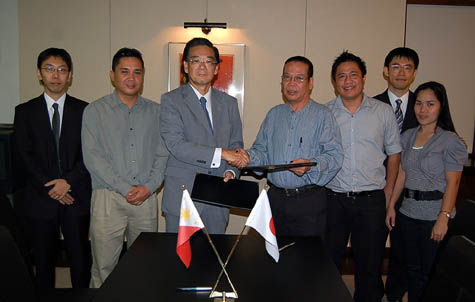Japanese Ambassador Makoto Katsura and Pag-Inupdanay Inc. Executive Director Teodorico Pe ñ a signed the grant contract for “The Project for the Construction of Vocational Training Center in Negros Occidental” on 18 March 2011 at the Embassy of Japan. The project, amounting to US$ 95,331 (approximately 4.1 million pesos), is funded through the Grant Assistance for Grassroots Human Security Projects (GGP).
Negros Island, which is often referred to as the sugar island, occupies around 60 % of sugar production in the Philippines. In the island, many farmers work for huge sugarcane plantations, due to the delay of the agrarian reform. Their monthly income only amounts to 1,500-3,000 pesos, therefore their family members including women and children are also forced to work in sugarcane plantations. These c hildren and youth up to 18 years old are often engaging in hazardous and exploitative works such as carry ing canes and apply ing fertilizers, which have been described as one of the worst forms of child labor by the International Labor Organization (ILO). Currently, around 140,000 minors are said to work under the severe conditions such as small amount of income and long time work.
Since 2003, Pag-Inupdanay Inc., a NGO based in Bacolod City, has been actively involved in bringing positive change s to the lives of poor women and child ren workers through the implementation of their poverty reduction programs. It has partnered with other non-government organizations (NGOs) as well as government institutions such as the Technical Education and Skills Development Authority (TESDA) in providing education and job skills trainings. However, the lack of their own training facilities and the increasing demand from women and child ren workers ha ve made their effort s more and more challenging.
Under th ese circumstances, Pag-Inupdanay Inc. sought the assistance from the Embassy of Japan. With the grant provided, a vocational training center will be constructed in Silay City. This center will serve as a venue for conducting vocational trainings related to various fields such as food processing, welding, carpentry, dressmaking, and computer literacy that help women and children venture into other livelihood activities other than work in the sugar plantations. The center is expected to benefit around 500 women and children from Sipalay City, and Municipalities of Candoni and Toboso.
Japan, as the top donor of the official development assistance for the Philippines, launched GGP in the Philippines in 1989 for the purpose of reducing poverty and helping various communities engaged in grassroots activities. GGP also contributes to the ensuring of “human security,” which is one of the major pillars of Japan's diplomacy and aims to empower vulnerable people to protect themselves from various threats. As of March 2011, 441 grassroots projects funded by GGP – ranging from roughly 1 to 4 million pesos – have been implemented by NGOs, local government units and other non-profit organizations. The total grant for these projects so far amounts to US$19,834,078. It is expected that this project will further contribute to strengthening the friendly ties between the peoples of Japan and the Philippines as well as fostering a strategic partnership between the two countries towards the future.


